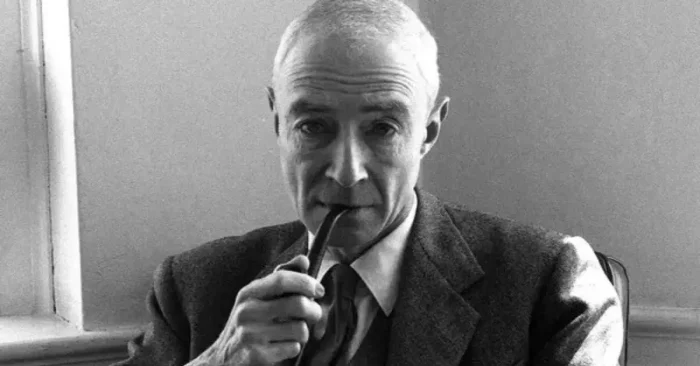Oppenheimer – Biography
Early Life and Education
Julius Robert Oppenheimer was born on April 22, 1904, in New York City to a wealthy, cultured family of German-Jewish descent. His father, Julius Oppenheimer, was a successful textile importer, and his mother, Ella Friedman, was a painter. Raised in Manhattan, Oppenheimer attended the Ethical Culture School, where he excelled academically and developed an early passion for science and literature. At age 12, he delivered a lecture on minerals to the New York Mineralogical Club, impressing the audience with his knowledge.
In 1922, Oppenheimer enrolled at Harvard University, completing his undergraduate degree in just three years. He studied chemistry but also pursued interests in philosophy, literature, and languages. After Harvard, he studied at the University of Cambridge’s Cavendish Laboratory under J.J. Thomson. Finding experimental physics challenging, he moved to the University of Göttingen in Germany, where he earned his Ph.D. in 1927 under Max Born. During this period, he collaborated with leading physicists and co-developed the Born–Oppenheimer approximation, a fundamental concept in quantum chemistry.
Academic Career and Scientific Contributions
Returning to the United States, Oppenheimer held positions at the California Institute of Technology and the University of California, Berkeley. He became a full professor at Berkeley in 1936. Oppenheimer’s research spanned quantum mechanics, nuclear physics, and astrophysics. He made significant contributions to the theory of cosmic ray showers and the understanding of neutron stars and black holes. His work on quantum electrodynamics and the Oppenheimer–Phillips process advanced the field of nuclear fusion.
Oppenheimer was known for his rigorous teaching style and ability to inspire students. He mentored several future Nobel laureates and was instrumental in establishing theoretical physics as a prominent discipline in American academia.
The Manhattan Project and World War II
In 1942, during World War II, Oppenheimer was appointed as the scientific director of the Manhattan Project, the U.S. government’s secret initiative to develop atomic weapons. He oversaw the construction of the Los Alamos Laboratory in New Mexico, assembling a team of top scientists to design and build the atomic bomb. Under his leadership, the project achieved the first successful test of a nuclear device, known as the Trinity test, on July 16, 1945.
The success of the Manhattan Project led to the deployment of atomic bombs on Hiroshima and Nagasaki in August 1945, contributing to Japan’s surrender and the end of World War II. Oppenheimer’s role in the project earned him the moniker “father of the atomic bomb.” However, he later expressed deep moral reservations about the use of nuclear weapons and the arms race that followed.
Post-War Career and Security Hearing
After the war, Oppenheimer became a chief advisor to the newly formed Atomic Energy Commission (AEC), where he advocated for international control of nuclear power and opposed the development of the hydrogen bomb. His stance, along with past associations with left-wing causes, led to suspicion during the Red Scare.
In 1954, Oppenheimer’s security clearance was revoked after a controversial hearing by the AEC, effectively ending his influence on U.S. nuclear policy. The hearing, widely viewed as a political maneuver, sparked debate about the role of scientists in government and the balance between national security and intellectual freedom.
Later Life and Legacy
Following the security hearing, Oppenheimer retreated from public life and focused on academic pursuits. He served as the director of the Institute for Advanced Study in Princeton, New Jersey, from 1947 to 1966, fostering interdisciplinary research and intellectual exchange.
In 1963, President Lyndon B. Johnson awarded Oppenheimer the Enrico Fermi Award, recognizing his contributions to theoretical physics. Oppenheimer died of throat cancer on February 18, 1967, in Princeton.
Oppenheimer’s legacy is complex, encompassing groundbreaking scientific achievements and profound ethical questions about the use of technology. His life has been the subject of numerous books, including the Pulitzer Prize-winning biography “American Prometheus,” and films, such as Christopher Nolan’s 2023 biopic “Oppenheimer.”
Frequently Asked Questions (FAQs)
Who was J. Robert Oppenheimer?
J. Robert Oppenheimer was an American theoretical physicist best known for his role as the scientific director of the Manhattan Project during World War II, which developed the first nuclear weapons.
What were Oppenheimer’s major scientific contributions?
Oppenheimer made significant contributions to quantum mechanics, nuclear physics, and astrophysics. He co-developed the Born–Oppenheimer approximation and conducted pioneering work on neutron stars and black holes.
Why was Oppenheimer’s security clearance revoked?
In 1954, Oppenheimer’s security clearance was revoked due to suspicions about his past associations with left-wing organizations and his opposition to the hydrogen bomb, amid the anti-Communist sentiment of the era.
What is Oppenheimer’s legacy?
Oppenheimer’s legacy includes his scientific achievements and his moral reflections on the use of nuclear weapons. He remains a symbol of the ethical dilemmas faced by scientists in the modern age.
Has Oppenheimer been portrayed in popular culture?
Yes, Oppenheimer has been the subject of various books, documentaries, and films, most notably the 2023 biographical film “Oppenheimer,” directed by Christopher Nolan.






